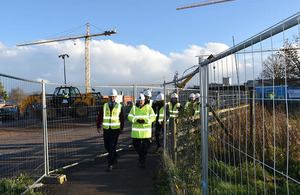Construction continues on world-class medical centre for Armed Forces
Defence Minister Mark Lancaster visited Loughborough today, where construction continues on a facility set to offer world-class medical services for injured members of the Armed Forces.

Minister for Defence Veterans Reserves and PersonnelMark Lancaster visited Loughborough today, where construction continues on a facility set to offer world-class medical services for injured members of the Armed Forces.
The new Defence and National Rehabilitation Centre will see leading rehabilitation services, currently delivered at Headley Court, move to a purpose-built location at Stanford Hall near Loughborough.
Construction is well under way for the site, set to be four times the size of Headley Court, and is expected to come towards a close around this time next year before the centre becomes operational in 2018.
Minister for Defence Veterans Reserves and Personnel, Mark Lancaster said:
It’s great to see the building work coming along as we remain on track to open this excellent centre in 2018, with good progress being made towards the development of the National part of the DNRC.
The brand new Defence facility will ensure that we can continue to lead the way in medical science and innovative technology to support the brave men and women who make enormous sacrifices to protect our country.
The new location in the Midlands means the site will be more accessible to personnel based in the UK. Significantly, it will also help facilitate a joint provision of care required for rehabilitation, a complex process, as it is closer to the Royal Centre for Defence Medicine and the University of Birmingham Hospital Trust - the main hospital for receiving military casualties.
The centre will improve and advance the cutting-edge treatments already available to injured members of the armed forces. It will provide immediate access to on-site patient diagnosis and treatment plans, greater advances in medical research and better outdoor facilities to support early stages of recovery.